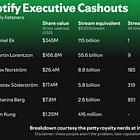Hey there, subscribers old and new!
Our previous post compared the value of Spotify executive’s stock cashouts to the streaming numbers of the top artists on the platform, and saw we’ve since seen quite the surge of new visitors and subscribers <3
With all you new folks here we thought it would be fitting to re-introduce ourselves and let you know who we are and why we’re here, so today we’re re-sharing how and why we started Infinite Catalog in the first place — there’s no better insight into why we care so much about making royalties easier and more transparent for catalogs and payees alike.
Whether you’ve heard it before or are hearing it for the first time, if you know someone else who might be interested in hearing our story, please feel free to share:
So without further ado, here’s The Story of IC, or: How I Learned To Stop Worrying And Love Royalties:
Hunter here, co-founder of Infinite Catalog and royalty nerd in chief.
People often ask how we got started, or why we built IC in the first place. Happily there’s a straightforward answer: we built IC to turn royalties from a weakness into a strength, for ourselves and for you.
A long time ago, I started a record label called Infinite Best. I just wanted to help artists put out records and get heard, but soon found myself in "spreadsheet hell," trying to figure out how much money was being earned and spent, and most importantly, what everybody was owed and what I was actually making.
I didn't really know what I was doing…
I lived in fear that I was doing it wrong, but had no one to turn to about it.
Turned out this was called "royalty accounting," and it was a big part of my job. But I didn't really know what I was doing, it took forever, and every six months I'd have to do it all over again. I lived in fear that I was doing it wrong, but had no one to turn to about it. Every label I spoke to seemed to feel the same way, and because of streaming and the explosion of new ways to earn income from music, it was getting harder to keep track of everything and get royalties done, let alone analyze the data or share it with our artists.
I looked for software that could help, some kind of “quickbooks for royalties,” but everything I found seemed really out of date, too complicated, too expensive. I looked for royalty services to do it for me, but they didn't seem to exist. So I stuck with spreadsheets, and began offering freelance royalty accounting services myself.
The folks who initially signed up were thrilled to get royalties off their plates, and soon I was earning more doing royalties than at my label. Eventually I asked Udbhav Gupta from the band Mr Twin Sister, no stranger to royalties and a talented programmer, if he might be interested in building the kind of software I thought should have existed in the first place.
We built a prototype and called it Infinite Catalog, seeing that it could work for record labels, publishers, managers, or anyone else who administered any kind of catalog, and especially the increasing number of people who do more than one thing.
We built it to handle any kind of income, so catalogs could add new revenue sources without needing separate systems for each, and focused on making it easy to onboard, keep royalties up to date, and add new catalog, so they could grow faster without adding to their admin burden.
And, in no small part because Udbhav is an artist/payee himself, we made sure catalogs could provide payees with access not just to statements, but also dashboards, data, and the tools to analyze it all themselves, so everyone could finally be on the same page and grow better together.
With IC, royalty accounting – once a source of frustration, tension, and FOMO about missed opportunities – can now be a strength, a value-add that catalogs are bringing to the table. As one of our early adopters put it, IC "provides a whole new level of transparency that we’re proud of, a significant talking point with potential signees."
Hundreds of catalogs now use IC to account to tens of thousands of payees, with more joining every day. We’re so grateful to do this work, and our excitement and energy to improve the software (and service!) gets stronger by the day – you might even say we're all growing better together.
Thanks for reading, and no matter what shape, size, or kind of catalog you are, we hope you’ll give IC a try. You can always contact me directly if you have any questions at hunter@infinitecatalog.com. I look forward to hearing from you!
– Hunter



